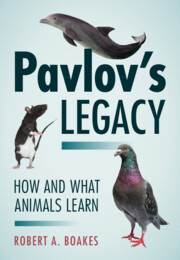Book contents
- Pavlov’s Legacy
- Pavlov’s Legacy
- Copyright page
- Contents
- Preface
- Acknowledgments
- 1 Ivan Pavlov, Conditioned Reflexes and Experimental Neuroses
- 2 Developing Habits
- 3 Learning Where Things Are and Where Events Happen
- 4 Fear, Avoidance, and Punishment
- 5 Comparative Psychology
- 6 Imprinting and Constraints on Learning
- 7 Discrimination Learning, Attention and Stimulus Generalization
- 8 B.F. Skinner and the Experimental Analysis of Behavior
- 9 How Animals Learn to Associate Events
- Notes
- References
- Index
8 - B.F. Skinner and the Experimental Analysis of Behavior
Published online by Cambridge University Press: 07 October 2023
- Pavlov’s Legacy
- Pavlov’s Legacy
- Copyright page
- Contents
- Preface
- Acknowledgments
- 1 Ivan Pavlov, Conditioned Reflexes and Experimental Neuroses
- 2 Developing Habits
- 3 Learning Where Things Are and Where Events Happen
- 4 Fear, Avoidance, and Punishment
- 5 Comparative Psychology
- 6 Imprinting and Constraints on Learning
- 7 Discrimination Learning, Attention and Stimulus Generalization
- 8 B.F. Skinner and the Experimental Analysis of Behavior
- 9 How Animals Learn to Associate Events
- Notes
- References
- Index
Summary
This chapter describes the life of B.F. Skinner, a behaviorist who remains as famous as Pavlov. It describes his development of the operant chamber - widely known as a Skinner box - and that of procedures used to control events within the chamber. These enabled complex experiments to be run, not only by Skinnerians who agreed with Skinners radical views on science and on the pre-eminent role of operant conditioning in human life, but also by those without any sympathy for such views. The chapter also traces the expansion of the movement, the Experimental Analysis of Behavior, founded by Skinner and his close friend and associate, Fred Keller, both within and beyond the United States. It notes the decline of Skinners influence following the cognitive revolution in American psychology; for example, challenges to his claim that human conditioning can occur without awareness.
Keywords
- Type
- Chapter
- Information
- Pavlov's LegacyHow and What Animals Learn, pp. 214 - 257Publisher: Cambridge University PressPrint publication year: 2023

